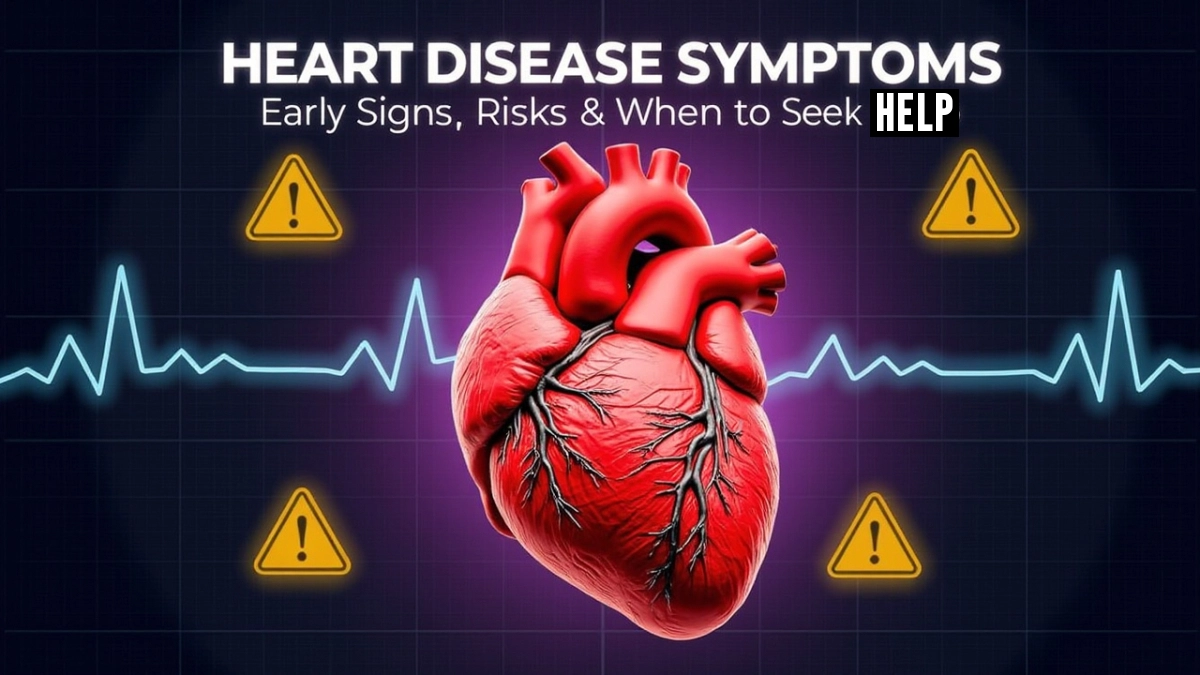Heart disease remains the leading cause of death globally, yet many people miss early warning signs. Symptoms can range from subtle fatigue to sudden chest pain—and ignoring them can be deadly.
This guide dives deep into heart disease symptoms, helping you recognize red flags, understand risk factors, and take action before it’s too late.
Common Heart Disease Symptoms
1. Chest Pain or Discomfort (Angina)
Example: David feels a heavy pressure in the center of his chest every time he walks uphill. The pain fades when he rests. He thinks it’s gas, but it’s actually stable angina.
- What it feels like: Pressure, tightness, or a squeezing sensation in the chest.
- When it happens: During physical activity or stress (stable angina) or unpredictably (unstable angina).
- Why it matters: Often the first sign of coronary artery disease (CAD).
Pro Tip: Not all chest pain is heart-related, but if it’s persistent or severe, seek help immediately.
2. Shortness of Breath
Example: Maria notices she gets out of breath just walking from the living room to the kitchen. She used to climb stairs with no issue. This early change points toward heart failure.
- Possible causes: Fluid buildup in the lungs (heart failure) or poor blood flow.
- When to worry: If breathing difficulties occur at rest or with minimal exertion.
3. Fatigue and Weakness
Example: John feels wiped out after making his bed or taking out the trash. Tasks that never bothered him now make him stop and rest.
- Why it happens: The heart struggles to pump blood efficiently, depriving muscles and organs of oxygen.
- Subtle clue: Sudden exhaustion after routine activities (e.g., climbing stairs).
4. Irregular Heartbeat (Arrhythmia)
Example: Sara feels like her heart “skips” every few beats. Other times it races for no reason while she’s sitting on the couch.
- Signs: Fluttering, racing, or skipped beats.
- Risks: Can lead to stroke or cardiac arrest if untreated.
5. Swelling in Legs, Ankles, or Feet (Edema)
- Cause: Fluid retention due to poor circulation (common in heart failure).
6. Dizziness or Fainting
- Red flag: Sudden lightheadedness may indicate low blood pressure or arrhythmia.
7. Pain Radiating to Arm, Neck, or Jaw
- Classic heart attack symptom: Often affects the left arm but can occur on either side.
Lesser-Known Symptoms (That Are Easy to Miss)
- Nausea or indigestion (especially in women).
- Cold sweats without exertion.
- Unexplained anxiety (feeling of “impending doom”).
Did You Know? Women are more likely to experience atypical symptoms like fatigue and nausea rather than chest pain.
When to Seek Emergency Help
Example: If someone has chest pain that lasts longer than five minutes and doesn’t improve with rest, call emergency services right away. Waiting even ten minutes can cause permanent damage.
Seek immediate medical attention if you experience:
- Chest pain lasting more than a few minutes
- Severe shortness of breath
- Sudden loss of consciousness
- Pain spreading to the arm, neck, or jaw
Time is critical—early intervention can prevent permanent damage.
Risk Factors That Increase Symptom Severity
Example: A smoker with diabetes may feel severe chest pain during a heart attack, while someone with no risk factors might notice only mild pressure.
- High blood pressure
- Diabetes
- Smoking
- Obesity
- Family history of heart disease
Prevention Tip: Regular check-ups and lifestyle changes (diet, exercise) can significantly reduce risks.
Action Steps: What to Do If You Notice Symptoms
Example: Write down when symptoms start, what you were doing, and how long they last. Bring this list to your doctor for faster diagnosis.
- Don’t ignore them—early detection saves lives.
- Track patterns (e.g., does fatigue worsen with activity?).
- Consult a doctor for tests like an ECG, stress test, or echocardiogram.
Final Thoughts
Heart disease symptoms vary widely, and some are dangerously easy to dismiss. Knowing the signs—both common and subtle—could mean the difference between life and death.
Your Next Step: If you’re at risk or experiencing symptoms, schedule a cardiac evaluation today.

